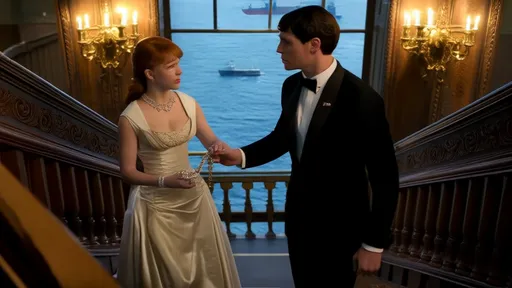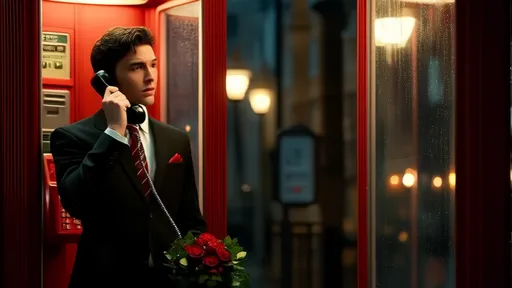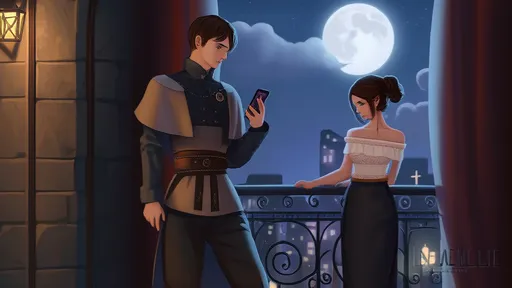The art of courtship has undergone a dramatic transformation in the digital age. Where once handwritten letters and phone calls were the primary means of romantic communication, we now live in an era dominated by texting, social media, and dating apps. Yet a growing movement advocates for what they call "old-school dating" - a return to more traditional methods of expressing romantic interest. At the heart of this debate lies a simple question: is a phone call truly more sincere than a text message when confessing feelings?
The Case for Vocal Vulnerability
Psychologists have long understood that voice carries emotional weight that text cannot replicate. The subtle tremble in someone's voice when they're nervous, the unconscious smile that changes their tone, the pregnant pauses between words - these nuances disappear in text messages. When someone picks up the phone to confess their feelings, they're exposing themselves to immediate reaction and potential rejection without the safety net of carefully composed words or emoji buffers.
There's an undeniable bravery in hearing someone's breath catch as they say "I like you" for the first time. The rawness of a phone call creates what communication experts call "emotional immediacy" - the sense that two people are sharing the same moment in real time, without filters or editing. This vulnerability often leads to deeper connections, as both parties feel they're experiencing something genuine rather than curated.
The Texting Generation's Defense
Millennials and Gen Z counter that texting allows for thoughtful expression. The ability to compose, edit, and reconsider one's words can lead to more meaningful confessions. For introverts or those with social anxiety, texting provides a necessary buffer that actually enables them to express feelings they might otherwise keep bottled up. There's also the practical consideration that people today are busy - texting allows romantic communication to happen amid packed schedules.
Moreover, digital natives argue that sincerity isn't about the medium but about the content and intent. A carefully crafted text message that comes from the heart can be just as meaningful as a phone call. They point to the rise of "love letters" via text - long, heartfelt messages that serve similar purposes to their handwritten predecessors. The key difference being accessibility and immediacy in the digital format.
The Neuroscience of Connection
Brain imaging studies reveal interesting differences in how we process voice versus text communication. Hearing a loved one's voice activates the auditory cortex while simultaneously triggering emotional centers in the brain. This dual activation creates stronger memory formation and emotional bonding. Text messages, while they can be deeply meaningful, primarily engage the language processing centers without the same emotional resonance.
This doesn't mean texting is inferior for all romantic communication. Research shows that ongoing text exchanges between established couples can maintain connection throughout the day. But for initial confessions or important emotional milestones, the neurological evidence suggests voice communication creates deeper impact.
The Performance Aspect of Modern Dating
Social media has turned much of modern dating into a performative act. Carefully curated profiles, strategically timed messages, and photo filters all contribute to what some call "the romantic highlight reel." In this context, the unpolished nature of a phone call becomes an act of rebellion against perfectionism. There's no chance to retake or edit a phone confession - what you hear is what you get, flaws and all.
This authenticity can be terrifying in a culture accustomed to presenting idealized versions of ourselves. But it's precisely this terror that makes phone confessions so powerful. The willingness to be imperfect, to risk embarrassment, speaks volumes about someone's sincerity. As one dating coach puts it, "No one fakes nervousness well over the phone."
Cultural Shifts in Communication Norms
Interestingly, the preference for phone versus text confessions often breaks down along generational lines. Those who came of age before smartphones tend to view phone calls as the gold standard for serious conversations. Digital natives, having grown up with texting as their primary communication method, often feel more comfortable expressing vulnerable emotions through written words.
This cultural divide has created amusing misunderstandings. Older daters might interpret a text confession as cowardly or insincere, while younger daters might view an unexpected phone call as intrusive or awkward. Bridging this gap requires understanding that sincerity can take different forms across communication styles.
The Middle Ground: Voice Messages
Some modern daters have found compromise in voice messages - the digital equivalent of mix tapes for the smartphone era. These audio snippets allow for vocal expression while maintaining some control over timing and content. A well-crafted voice message can capture the emotional richness of a phone call while giving the recipient space to process before responding.
This hybrid approach suggests that perhaps the medium matters less than the thought behind it. Whether through phone calls, texts, or voice messages, what ultimately resonates is the authenticity of the emotion and the willingness to be vulnerable. The "old-school" dating advocates might be onto something about vocal connection, but the digital generation has valid points about accessibility and intentionality.
The Verdict: Context is King
After examining all angles, it becomes clear there's no one-size-fits-all answer. The sincerity of a confession depends less on the technology used and more on the people involved and their communication styles. For some, a trembling voice over the phone will always feel more genuine. For others, a thoughtfully composed text message allows them to express feelings they couldn't articulate in real time.
Perhaps the most important takeaway is that in our digital age, we've gained convenience but lost certain depths of connection. The old-school dating movement reminds us that sometimes, the more vulnerable path leads to richer rewards. Whether through phone calls or texts, what matters most is showing up authentically and being willing to risk your heart - technology is just the tool, not the emotion itself.

By /Jul 3, 2025

By /Jul 3, 2025

By /Jul 3, 2025

By /Jul 3, 2025

By /Jul 3, 2025

By /Jul 3, 2025

By /Jul 3, 2025

By /Jul 3, 2025

By /Jul 3, 2025

By /Jul 3, 2025

By /Jul 3, 2025

By /Jul 3, 2025

By /Jul 3, 2025

By /Jul 3, 2025

By /Jul 3, 2025

By /Jul 3, 2025

By /Jul 3, 2025

By /Jul 3, 2025